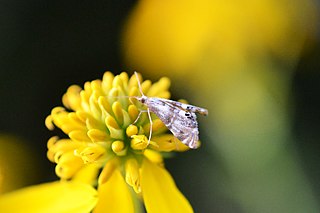
The Pyraloidea are a moth superfamily containing about 16,000 described species worldwide, and probably at least as many more remain to be described. They are generally fairly small moths, and as such, they have been traditionally associated with the paraphyletic Microlepidoptera.

Niphograpta is a genus of moths of the family Crambidae. It contains only one species, the water hyacinth moth. It is native to the Amazon basin, but has been introduced in North America, Africa and Australia to control the spread of water hyacinth.

Sclerocona is a genus of moths of the family Crambidae which contains only one species, Sclerocona acutella. It was first described by the Prussian biologist Eduard Friedrich Eversmann in 1842.

Dioryctria disclusa, the webbing coneworm or rusty pine cone moth, is a species of moth of the family Pyralidae. It is found in North America from New Brunswick to Florida, west to Texas and north to Manitoba.
Nymphicula saigusai is a moth in the family Crambidae. It was described by Yoshiyasu in 1980. It is found in Japan.

Petrophila bifascialis, the two-banded petrophila moth, is a moth in the family Crambidae. It was described by Robinson in 1869. It is found in North America, where it has been recorded from Nova Scotia to Florida, west to Texas and north to Ontario.
Eschata xanthorhyncha is a moth in the family Crambidae. It was described by George Hampson in 1896. It is found in Sri Lanka.
Abegesta remellalis, the white-trimmed abegesta or white-trimmed brown pyralid moth , is a moth in the family Crambidae. It was described by Herbert Druce in 1899. It is found in Mexico and the south-western United States, where it has been recorded from Arizona, California and New Mexico.
Metaprotus magnifica is a moth in the family Crambidae. It was described by Edward Meyrick in 1887. It is found in Australia, where it has been recorded from New South Wales.

Pyrausta trizonalis is a moth in the family Crambidae described by George Hampson in 1899. It is found in Orizaba, Mexico.
Uresiphita insulicola is a moth in the family Crambidae. It is found in Australia, where it has been recorded from Lord Howe Island, Norfolk Island and Queensland.
Polygrammodes herminealis is a moth in the family Crambidae. It was described by Schaus in 1920. It is found in Brazil (Paraná).
Psara prumnides is a species of moth in the family Crambidae. It was described by Herbert Druce in 1895. It is found in Mexico, Costa Rica, Honduras and Panama.

Pycnarmon alboflavalis is a moth in the family Crambidae. It was described by Frederic Moore in 1888. It is found in India and Bhutan.
Sameodes alexalis is a moth in the family Crambidae. It is found in the Philippines (Luzon).
Sameodes ennoduisalis is a moth in the family Crambidae. It is found in the Philippines (Luzon).
Tyspanodes flaviventer is a moth in the family Crambidae. It was described by Warren in 1891. It is found in India.
Ambia fusalis is a moth in the family Crambidae. It is found in Indonesia (Bali).
Ambia mesoscotalis is a moth in the family Crambidae. It is found in Indonesia, where it has been recorded from the Maluku Islands (Banda).
Ambia oligalis is a moth in the family Crambidae. It is found on the Louisiade Islands.






